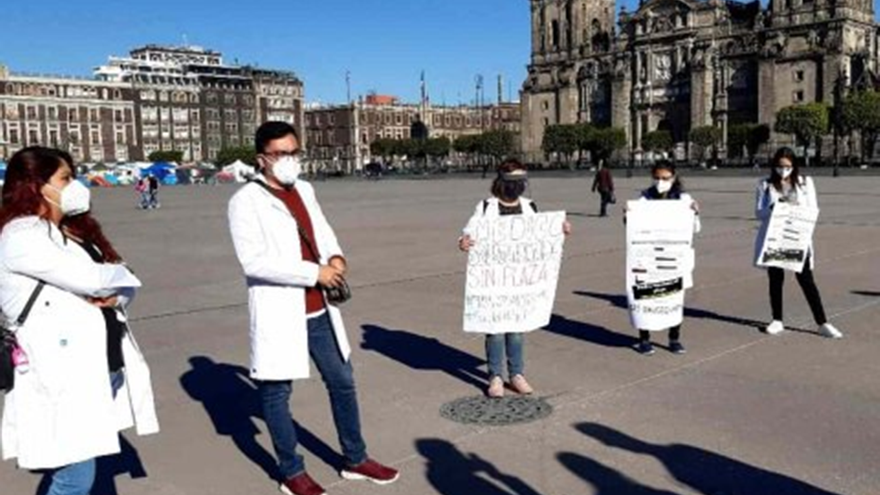
![]() 14ymedio, Lorey Saman, Mexico, February 18, 2021 — Around 40 Mexican doctors have come together to file amparo lawsuits for protection from being forced to study their specialty in Cuba by the Government of Andrés Manuel López Obrador.
14ymedio, Lorey Saman, Mexico, February 18, 2021 — Around 40 Mexican doctors have come together to file amparo lawsuits for protection from being forced to study their specialty in Cuba by the Government of Andrés Manuel López Obrador.
The writ of amparo—a legal instrument that exists in Mexico to protect citizens from possible arbitrariness by the State—is based on alleged violations in the selection process, which they agreed to after passing the National Examination of Applicants for Medical Residency (ENARM) last November.
“In Mexico, any act of authority must be duly founded and motivated, and if it had been established in the call for applicants that the only place of destination was Cuba, there would be no problem,” the lawyer Miguel Ángel Rodríguez, representing to the plaintiffs in Mexico City, explains to 14ymedio. “The point is that the doctors took the exam, but they weren’t told that it was to study in only one country.”
López Obrador announced in May last year that they would create a program of specialty scholarships abroad for doctors due to the lack of places in Mexico. In November, the health authorities reported not only the doubling of places but also the launch of up to 1,600 scholarships abroad, destined for Canada, the United States, Argentina, Cuba and Australia, under the National Council for Science and Technology of Mexico (CONACYT).
It should be noted that in these countries, access to medical residency for foreigners involves strict immigration requirements as well as qualification by a demanding specialty exam, something which the Mexican Government did not mention at any time when announcing the creation of the scholarships.
When CONACYT published the requirements to fill 1,000 places with scholarships on December 15, the students who had already received their ENARM diplomas discovered that the only destination available to them was Cuba.
The Undersecretary of Health Hugo López-Gatell— the visible face of the Government during the Covid pandemic—told the protesters that they “are free” to not go to the Island, but in this case they will have to repeat the exam in the next call.
In this regard, the lawyer recalled that the Inter-American Court of Human Rights ensures the rights of people during the pandemic, and that the document asks governments and their leaders to be ethical and clear in their pronouncements. The official’s position, Rodríguez says, was added as evidence in the last lawsuit.
“There were only four locations authorized in Mexico where you could take the exam, and doctors from all over the Republic had to travel to these places. Many of them had to borrow money to do so. They didn’t know that they would have only one option for being placed, and this is something that López-Gatell didn’t consider. He is not taking into account the effort put in by the doctors who participated and won a place in the quota,” the lawyer points out.
“The rules weren’t clear, which is either an inconvenient mistake or a purposeful violation, and that is what we are contesting by way of a writ of amparo,” insists Rodríguez, a member of the Lex Artis Medica, a medical law group.
“Changing these circumstances is detrimental to the rights of resident doctors, who have earned a place in Mexico’s academic system,” he explains. “We want the judge to order the authority to respect the doctors’ rights, since they passed the exam.”
According to the lawyer, the doctors are aware that the Mexican health system can’t take on so many residents, and in the event that the State alleges that there are no places to send applicants, the lawsuit also requests that the quota they’ve already obtained serve them for the following year.
“This is not a problem generated by the doctors; it’s a problem that the State itself created by increasing the number of places, and by the Mexican health system for not having the capacity to accept them,” he asserts.
The lawyer also considers it extremely serious that the Cuban Medical Services Marketing Company prohibits postgraduate studies for HIV carriers and pregnant women. “The State should put an end to these discriminatory barriers and gender-based violence and it hasn’t done so, nor has it issued one single statement of agreement to improve these circumstances,” Rodríguez denounces. “In no way are we asking the Court to issue a recommendation to another country, but it can tell the Government to revise those parts of the agreement between Mexico and Cuba.”
The process began with the lawsuit filed last January by 12 doctors, which was joined at the beginning of February by another group. Little by little, Rodríguez assures, more doctors are being added: “They can either lose their place and retake the exam or join the lawsuit.”
The Covid-19 pandemic has slowed down the process due to the suspension of activities in the courts, but this week the doctors were informed that the lawsuits are already being reviewed. “At any moment we will have a resolution; either they will support the claims or they will ask us to clarify some point for the judge; in the worst case, they will dismiss the lawsuits.”
In March the doctors are supposed to begin residency in their specialties, but the processing of the protection orders could postpone their studies.
Translated by Regina Anavy
____________
COLLABORATE WITH OUR WORK: The 14ymedio team is committed to practicing serious journalism that reflects Cuba’s reality in all its depth. Thank you for joining us on this long journey. We invite you to continue supporting us by becoming a member of 14ymedio now. Together we can continue transforming journalism in Cuba.
